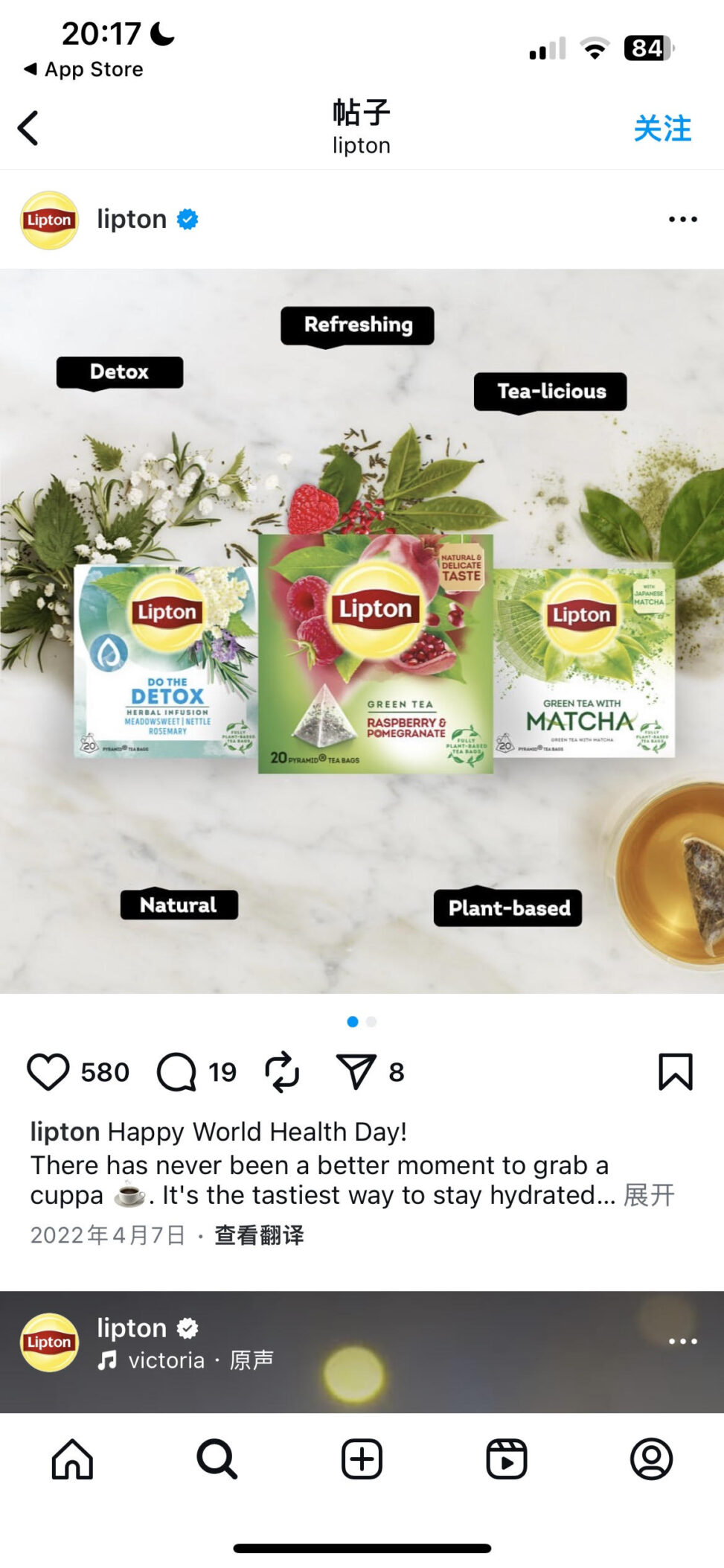Lipton “Happy World Health Day”
Ziyi Wang
October 7th, 2025
The Lipton Instagram post communicates that grabbing a cup of tea is a tasty, health forward choice aligned with World Health Day, and it hints at social or ecological responsibility through on image tags like “Natural,” “Plant based,” and “Detox” plus icons on the boxes, though these cues are more suggestive than evidential. It tries to convince me to buy the three featured SKUs (Detox herbal infusion, Raspberry & Pomegranate green tea, and Matcha green tea) and to accept the idea that everyday beverage choices support personal wellness and light environmental care. I fit the target audience as a mobile Instagram user who follows food and wellness content and prefers convenient, affordable “better for you” products presented in clean, minimalist aesthetics. The ad appeals to me visually—the high key flat lay, greens and whites, and flavor props are attractive—yet I’m skeptical of the responsibility claims because terms like “plant based” are inherent to tea and “natural/detox” are vague without third party proof. The screen grab shows the ad in situ on Instagram, fulfilling the requirement to document the encounter, and the post is unmistakably image based, using a photograph with minimal text so the picture carries the persuasive weight.
My analysis applies core media theories to explain both how the ad works and why its “responsibility” cues are thin. Using semiotics (Barthes), I distinguish denotation (three tea boxes, botanicals, cup) from connotation (purity, freshness) and show how the black sticker labels anchor a preferred wellness reading while building the myth that ethical living is achievable through a simple purchase. (1) Drawing on Hall’s encoding/decoding, I outline the preferred, negotiated, and oppositional readings produced by Instagram’s context. From green marketing and greenwashing scholarship (Peattie & Crane; Lyon & Montgomery), (2) I classify “plant based” and “natural/detox” as vague or inherent attributes that risk “no proof” or “hidden trade off” claims. (3) The lens of commodity activism/purpose branding explains how the World Health Day tie in individualizes systemic health and supply chain issues into feel good consumption. Finally, visual rhetoric and ideology help assess the high key flat lay, green palette, logo salience, and strategic absence of people or production scenes as aesthetic choices that naturalize the brand’s claim while deflecting scrutiny.
The Instagram post is by Lipton and promotes three boxed hot tea products—Do the Detox (herbal infusion), Green Tea Raspberry & Pomegranate, and Green Tea with Matcha—via a still photograph showing a bright overhead flat lay on white marble: the three boxes sit left to right and are ringed by flavor props (flowers, tea leaves, raspberries, pomegranate seeds, matcha powder), with a cropped cup of amber tea in the lower right and five black sticker tags (“Detox,” “Refreshing,” “Tea licious,” “Natural,” “Plant based”) hovering around them. Side to side, the packs form a shallow arc; top to bottom, an airy upper third holds two stickers, a dense middle band concentrates packages and botanicals, and the lower field is anchored by the tea cup and two more stickers; greens and whites dominate while the yellow red Lipton roundel provides high contrast focal points; the image is studio crisp, realistic, and character free so attention stays on products and “nature” proxies. Its message is that buying Lipton is a tasty, everyday act of wellness that lightly signals ecological responsibility, conveyed mostly through pictorial cues—green palette, fresh botanicals as “proof,” flat lay tidiness, and IG native stickers—plus a caption tying the post to World Health Day. For wellness curious mobile scrollers seeking convenient, affordable “better for you” swaps, the visual is effective and instantly legible, though the responsibility cues are thin (tea is inherently plant based; “natural/detox” are vague) so it appeals aesthetically but only partly persuades me on ethics. Company materials claim responsible sourcing, pesticide reduction, farmer partnerships,(4) packaging reduction, and an SBTi validated net zero 2040 target (5), while trade press reports a zero landfill milestone at Lipton’s Suffolk, VA plant—evidence of waste management progress—but these are not substantiated in frame at the SKU level. Corporate context (Unilever’s sale of its tea business to CVC’s Lipton Teas and Infusions in 2022) helps explain renewed ESG framing driven by investor and regulatory pressure; Unilever era initiatives appear to continue, yet this specific ad would be stronger with on image or linked third party certifications and metrics (sourcing provenance, labor standards, packaging end of life, emissions) to shift from purpose signaling to substantiated practice.
Conclusion. Lipton’s post is a polished exercise in wellness aesthetics and platform native persuasion. Through semiotic anchorage, Instagram’s visual vernacular, and the strategic absence of production contexts, it sells flavor and a feeling of responsible modernity. What it does not provide, in the image itself, is verifiable evidence of social or ecological responsibility. To move from purpose signaling to substantiated practice, the brand would need on frame or linked third party certifications and metrics—sourcing provenance, labor standards, packaging end of life, and emissions data—so viewers can evaluate the claim rather than simply feel it.
Bibliography
(1) Barthes, R. (1977). Rhetoric of the Image. In Image, Music, Text (S. Heath, Trans.).
New York: Hill and Wang.
https://pages.ucsd.edu/~bgoldfarb/cocu108/data/texts/barthes_rhetoric_of.pdf
(2) Peattie, K., & Crane, A. (2005). Green marketing: legend, myth, farce or prophecy?
Qualitative Market Research, 8(4), 357–370.
https://www.emerald.com/qmr/article/8/4/357/359333/Green-marketing-legend-myth-farce-or-prophesy
(3) Lyon, T. P., & Montgomery, A. W. (2015). The Means and End of Greenwash. Organization & Environment, 28(2), 223–249.
https://journals.sagepub.com/doi/10.1177/1086026615575332
(4) Lipton (brand pages). Sustainability claims and commitments: purpose, sourcing, packaging, farming.
https://www.lipton.com/us/en/our-purpose/
(5)SBTi validation for LIPTON Teas & Infusions’ net-zero by 2040 (third-party announcements).
https://www.anthesisgroup.com/case-studies/lipton-teas-and-infusions-sbt-net-zero/


Provide Feedback